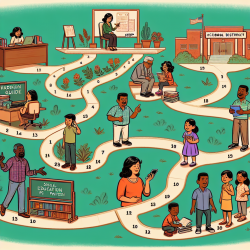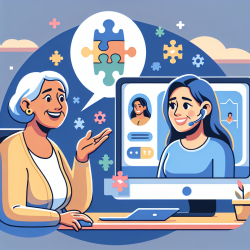Introduction
Adverse Childhood Experiences (ACEs) are more than just challenging moments in a child's life; they are significant events that can shape their future health and well-being. The Empower Action Model, as discussed in the research article "The Empower Action Model: A Framework for Preventing Adverse Childhood Experiences by Promoting Health, Equity, and Well-Being Across the Life Span," offers a comprehensive approach to transforming these adversities into resilience. This model is particularly relevant for practitioners in speech-language pathology and other fields dedicated to improving child outcomes.
Understanding the Empower Action Model
The Empower Action Model builds on existing evidence around ACEs and integrates key public health frameworks such as the socio-ecological model, protective factors, race equity and inclusion, and the life course perspective. By addressing ACEs as a root cause of disease, this model promotes resilience and health equity across multiple levels of influence, from individual to policy levels.
Key Principles of the Model
- Understanding: Recognizing the impact of ACEs on health and well-being.
- Support: Providing positive relationships and environments that buffer the effects of adversity.
- Inclusion: Ensuring equitable access to resources and opportunities for all children and families.
- Connection: Building strong community ties that foster resilience.
- Growth: Encouraging individual development and lifelong learning.
Implementing the Model in Practice
For practitioners, the Empower Action Model provides a roadmap for creating positive change. Here are some actionable steps:
- Build Resilience: Integrate activities that teach stress management and emotional regulation into therapy sessions.
- Create Positive Environments: Foster safe and supportive settings that encourage social and emotional well-being.
- Promote Individual Development: Tailor interventions to meet the unique developmental needs of each child.
- Share Resources: Connect families with community resources that address basic needs and support well-being.
- Support Positive Relationships: Encourage strong, trusting relationships between children and caregivers.
Encouraging Further Research
While the Empower Action Model provides a solid framework, continuous research and adaptation are essential. Practitioners are encouraged to engage with ongoing studies and contribute to the growing body of knowledge on ACEs and resilience. By doing so, they can refine their approaches and enhance the effectiveness of their interventions.
Conclusion
The Empower Action Model is a powerful tool for practitioners committed to improving outcomes for children facing adversity. By implementing its principles and actions, we can create environments that nurture resilience and promote health equity. For those interested in delving deeper into the research, the original paper provides valuable insights and guidance.
To read the original research paper, please follow this link: The Empower Action Model: A Framework for Preventing Adverse Childhood Experiences by Promoting Health, Equity, and Well-Being Across the Life Span.










